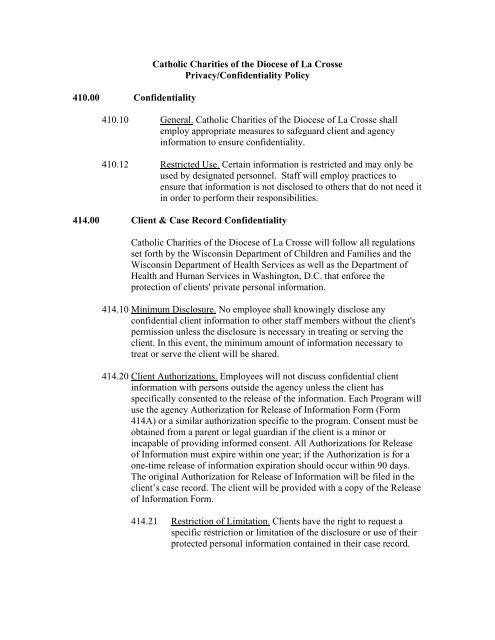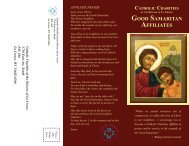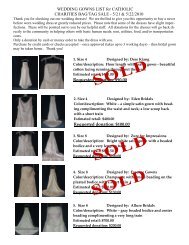Privacy Confidentiality Policy - Catholic Charities
Privacy Confidentiality Policy - Catholic Charities
Privacy Confidentiality Policy - Catholic Charities
Create successful ePaper yourself
Turn your PDF publications into a flip-book with our unique Google optimized e-Paper software.
410.00 <strong>Confidentiality</strong><br />
<strong>Catholic</strong> <strong>Charities</strong> of the Diocese of La Crosse<br />
<strong>Privacy</strong>/<strong>Confidentiality</strong> <strong>Policy</strong><br />
410.10 General. <strong>Catholic</strong> <strong>Charities</strong> of the Diocese of La Crosse shall<br />
employ appropriate measures to safeguard client and agency<br />
information to ensure confidentiality.<br />
410.12 Restricted Use. Certain information is restricted and may only be<br />
used by designated personnel. Staff will employ practices to<br />
ensure that information is not disclosed to others that do not need it<br />
in order to perform their responsibilities.<br />
414.00 Client & Case Record <strong>Confidentiality</strong><br />
<strong>Catholic</strong> <strong>Charities</strong> of the Diocese of La Crosse will follow all regulations<br />
set forth by the Wisconsin Department of Children and Families and the<br />
Wisconsin Department of Health Services as well as the Department of<br />
Health and Human Services in Washington, D.C. that enforce the<br />
protection of clients' private personal information.<br />
414.10 Minimum Disclosure. No employee shall knowingly disclose any<br />
confidential client information to other staff members without the client's<br />
permission unless the disclosure is necessary in treating or serving the<br />
client. In this event, the minimum amount of information necessary to<br />
treat or serve the client will be shared.<br />
414.20 Client Authorizations. Employees will not discuss confidential client<br />
information with persons outside the agency unless the client has<br />
specifically consented to the release of the information. Each Program will<br />
use the agency Authorization for Release of Information Form (Form<br />
414A) or a similar authorization specific to the program. Consent must be<br />
obtained from a parent or legal guardian if the client is a minor or<br />
incapable of providing informed consent. All Authorizations for Release<br />
of Information must expire within one year; if the Authorization is for a<br />
one-time release of information expiration should occur within 90 days.<br />
The original Authorization for Release of Information will be filed in the<br />
client’s case record. The client will be provided with a copy of the Release<br />
of Information Form.<br />
414.21 Restriction of Limitation. Clients have the right to request a<br />
specific restriction or limitation of the disclosure or use of their<br />
protected personal information contained in their case record.
414.22 Disclosures without Authorization. In certain instances, CCDL<br />
will release client information without the client's authorization.<br />
These instances include the following:<br />
• CCDL must disclose protected client information to the<br />
Department of Health & Human Services for compliance<br />
investigation purposes.<br />
• CCDL may disclose protected client information without<br />
client authorization if it is allowed under the HIPAA<br />
<strong>Privacy</strong> Rule or required by law relating to:<br />
o Child abuse<br />
o Neglect<br />
o Domestic violence<br />
o Judicial and administrative proceedings<br />
o Law enforcement purposes<br />
o For certain public health activities including<br />
disclosures for the purpose of preventing or<br />
controlling disease, injury, or disability, and<br />
disclosures related to victims of child abuse or<br />
neglect<br />
o For health oversight (audits; civil, administrative,<br />
or criminal investigations; licensure or<br />
disciplinary actions)<br />
o If about decedents (to a law enforcement official<br />
if suspicion that the death resulted in criminal<br />
conduct or to coroners or medical examiners for<br />
the purpose of identifying the deceased or<br />
determining the cause of death)<br />
o For certain research purposes, if all criteria under<br />
the HIPAA <strong>Privacy</strong> Rule are met<br />
o To avert a serious threat to health or safety<br />
including a duty to warn pursuant to CCDL policy<br />
822<br />
o For specialized government functions<br />
o For worker’s compensation<br />
o For certain marketing activities, such as informing<br />
clients of new staff or programs. Client<br />
information cannot be disclosed to business<br />
associates or to an institutionally related<br />
foundation for the purpose of raising funds for its<br />
own benefit<br />
o For treatment or payment activities such as case<br />
consultation and insurance claims<br />
414.23 Minimum Necessary. When disclosing protected health<br />
information, staff must limit the information disclosed to the
minimum information necessary to carry out the given purpose<br />
or function.<br />
414.24 Receive an Accounting of Disclosures Clients have the right to<br />
receive an accounting of all the disclosures provided to others<br />
where their authorization was not required. <strong>Catholic</strong> <strong>Charities</strong> of<br />
the Diocese of La Crosse will keep a record of all disclosures in<br />
the case record (Form 414A) for a period of seven years.<br />
414.25 Informed Consent. The caseworker will ensure that the client is<br />
well informed of the reasons and/or benefits to consenting to the<br />
release of their information. Additionally, precautions will be<br />
instituted to ensure that requests for client information are valid<br />
and in the best interests of the client.<br />
414.30 Reporting All employees will report any actual or potential breaches of<br />
client confidentiality to the <strong>Privacy</strong> Officer of the organization.<br />
414.40 Client Case Records Client information related to treatment and service is<br />
kept in confidential client case records. Staff members are only provided<br />
access to the case records and client information required for them to carry<br />
out their job duties. Any client case record information stored in electronic<br />
form in the computer system will be deleted when it is no longer necessary<br />
to serve the client or is not required by law. All client information stored<br />
in electronic form will be appropriately safeguarded by the use of<br />
computer passwords. All client information stored in paper form will be<br />
kept in locked metal file cabinets inside locked rooms. Access to the<br />
cabinets will only be granted to staff members who need the client's<br />
information.<br />
414.41 Record Retention. All case records will be kept for a minimum of<br />
7 years after case closing unless specific regulations governing a<br />
particular program require records to be maintained beyond seven<br />
years.<br />
414.42 Record Disposal in Event of Agency Closing. In the event that<br />
<strong>Catholic</strong> <strong>Charities</strong> of the Diocese of La Crosse is no longer<br />
operating, any case records that need to be retained will be<br />
transferred to the State of Wisconsin or the Chancery Office of the<br />
Diocese of La Crosse.<br />
414.43 Staff Use of Case Records. Access to case records will be limited<br />
to only those staff members who require information in the case<br />
record to carry out their job duties. When an employee takes a<br />
record from their own file cabinet out of the office, takes a record<br />
from another employee’s file cabinet, or takes a record from the
closed records storage, a Record Checkout Form (Form 414E)<br />
must be completed. The Record Checkout Form will be filed in the<br />
front of the file drawer. This will help any staff member who is<br />
looking for the record to know when the record was checked out<br />
and by which employee. When records are returned, the Record<br />
Checkout Form should be removed and shredded.<br />
414.50 Master Appointment Books All master appointment books will be kept in<br />
locked metal file cabinets when not in use. The confidentiality of client<br />
information shall be preserved by listing only the client's first name and<br />
first initial of the last name in all appointment books, personal day<br />
planners, computer calendars, and personal digital assistants used by staff.<br />
414.60 Database. Data from all agency services is entered and stored in the<br />
agency’s computer system by the caseworker, program administrative<br />
assistant, or secretary, for the purpose of providing generic information for<br />
grants and other agency reports. The database is protected by a system of<br />
passwords and may only be accessed by appropriately authorized agency<br />
employees. All staff with such access are expected to follow the “need to<br />
know” standard in working with this data.<br />
414.70 Transporting Client Case Records. Client case records should not be<br />
transported outside of <strong>Catholic</strong> <strong>Charities</strong> unless it is necessary for direct<br />
client service. In the event it is necessary to transport the records,<br />
employees will utilize locking briefcases or totes to secure the records.<br />
All material transported by vehicle shall be stored in the trunk of the<br />
vehicle or locked and concealed inside the vehicle.<br />
414.80 Receipt Books. Receipt Books will be kept in a secured and locked drawer<br />
or cabinet when not in use. Care will be taken to ensure that other clients<br />
do not see any other client's information contained in these documents<br />
when in use.<br />
414.90 Billing Files, Appointment Books, and Dictation Tapes. These materials<br />
will be kept in secure, locking cabinets or drawers when not in use.<br />
Dictation tapes will be erased after use.<br />
414.100 Use of Cell Phones. Identifying client information will be avoided when<br />
using cell phones in public areas.<br />
414.110 Chance Meetings Employees of <strong>Catholic</strong> <strong>Charities</strong> will not initiate<br />
contact with clients during chance meetings outside of the office.<br />
414.120 Notice of Information Practices An attempt will be made to provide all<br />
clients with a copy of our Notice of Information Practices (Form 414B)<br />
no later than the date of first service delivery, detailing how we will
handle their protected personal information. If the first service delivery<br />
occurs over the telephone, the Notice will be sent no later than the day<br />
following the telephone conversation. Clients will be asked to sign an<br />
Acknowledgment Form (Form 400A) indicating receipt of the Notice<br />
and this will be kept in their client case record.<br />
414.130 Staff Training and Acknowledgement All staff are required to read the<br />
confidentiality policies of <strong>Catholic</strong> <strong>Charities</strong> of the Diocese of La Crosse<br />
and sign an Employee <strong>Confidentiality</strong> Pledge (Form 414C). Any<br />
violation of a client's right to privacy may result in disciplinary action up<br />
to and including termination of employment. Staff will also receive<br />
training on the HIPAA regulations during orientation and annually<br />
thereafter. Staff will sign an acknowledgment attesting to such training<br />
(Form 414D).<br />
423.00 Client Case Record Requests<br />
423.10 General Clients of <strong>Catholic</strong> <strong>Charities</strong> of the Diocese of La Crosse<br />
(CCDL) have rights with regard to the information contained in<br />
their client case record. The following policies are derived from<br />
the Code of Federal Regulations, Title 45, Public Welfare and<br />
Human Services and Wisconsin Statute sec. 51.30 and HFS 92,<br />
Wisconsin Administrative Code.<br />
423.20 Requests and Response Clients must submit all requests regarding<br />
their case record in writing by completing the Client Case Record<br />
and Communication Request Form (Form 422A). After completing<br />
the form, client should return the form to his/her caseworker. The<br />
caseworker should forward the form to the Client Rights Specialist<br />
who will respond to the client’s request by completing the Agency<br />
Response to Client Case Record or Communication Request (Form<br />
422B).<br />
423.30 Access. Clients have the right to access their case record to inspect<br />
and have copies made of documents that pertain to their physical<br />
health or medications. This does not include psychotherapy notes,<br />
confidential information about family members or third parties<br />
who may be mentioned in the file or who have provided<br />
information requested to be kept confidential, or information that<br />
has been compiled in reasonable anticipation for use in civil,<br />
criminal or administrative proceedings. If the request is granted,<br />
the inspection will be conducted on <strong>Catholic</strong> <strong>Charities</strong>’ premises<br />
and a professional staff member or Executive will be present.<br />
423.31 Response Time: CCDL must respond to the client's<br />
request to access within 30 days. If an extension is
necessary, CCDL may extend the response time<br />
another 30 days.<br />
423.32 Reasonable costs for providing the case record for<br />
inspection or copying may be passed along to the<br />
client.<br />
423.40 Amendment. Clients have the right to request an amendment of<br />
their case record.<br />
423.41 Response Time: CCDL must respond to the client's<br />
request to amend his/her record within 60 days. If<br />
an extension is necessary, CCDL may extend the<br />
response time another 30 days.<br />
423.42 Informing Others: If CCDL agrees to the<br />
amendment, it must obtain the client's identification<br />
of and agreement to notify all relevant persons with<br />
which the amendment needs to be shared.





